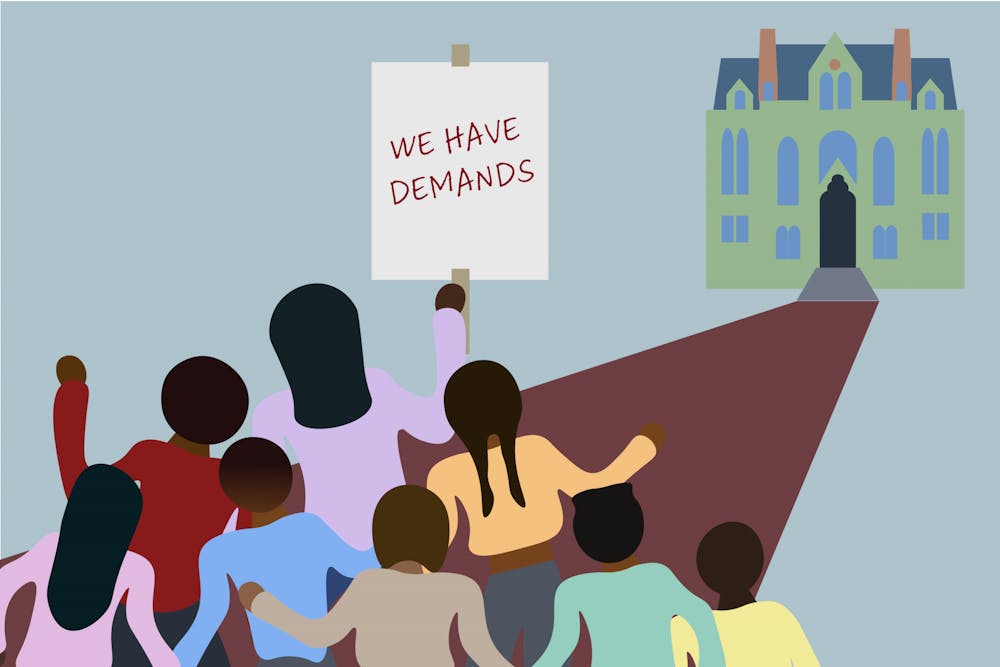In light of the upcoming presidential election and recent nationwide protests against systematic racism, UMOJA — the umbrella organization for Black student groups on campus — is demanding action from Penn to prioritize the health and well-being of Black students on campus, and to aid organizations benefitting West Philadelphia.
On June 4, the UMOJA Board sent a letter to members of Penn administration outlining the group's demands. The group is insisting Penn create a house for Black students on Locust Walk, terminate its relationship with the Philadelphia Police Department, donate to West Philadelphia organizations, and provide academic and mental health resources specifically for Black students.
The letter also requests the creation of a "COVID Response Fund" to address students' financial concerns during the upcoming academic year and expects action to ensure affordable housing for students in the fall in the case that campus does not reopen.
The group's board wrote that Penn must prioritize Black students’ safety on campus in the fall, particularly as tensions rise due to the upcoming presidential election.
“After the 2016 election, Black students at Penn faced blatant and horrific threats from white supremacists and we see similar, or arguably worse, levels of racial and political tension rising leading up to the 2020 election,” the letter states.


RELATED:
Thousands petition U. to cut ties with Philly PD, reform militarized campus 'police state'
6B leaders say the ARCH's new renovation sidesteps concerns of cultural centers
Penn offers cultural centers a space in ARCH's upper floors — but 6B is hesitant
UMOJA, the representative voice of Black students and Penn's Black student organizations, serves as the liaison between Black undergraduates and University administrators.
As they requested, UMOJA leadership met over Zoom on June 10 with Provost Wendell Pritchett, Vice Provost for Equity and Access William Gipson, Senior Vice President for Institutional Affairs and Chief Diversity Officer Joann Mitchell, Chief Wellness Officer Benoit Dubé, and University Chaplain Charles Howard to discuss the demands put forth in the letter.
Rising College junior and UMOJA finance and fundraising chair Justin Arnold said that he did not feel optimistic after the meeting because administration did not commit to designating a building on Locust for Black students or to divest from local police.
Arnold said that UMOJA has been asking Penn for a house on Locust for 20 years, and that Black students need a space where they can feel safe in the upcoming semesters. Makuu, the Black cultural center on campus, has been located in a room between two other cultural centers in the basement of the ARCH since 2000.
“At this point, we’re angry, we’re upset, we’re frustrated with everything that’s going on, and we’re honestly demanding this from administration,” Arnold said. “This is no longer peacefully requesting a space to be; it’s more of a demand at this point because we’ve been ignored for too long.”
In the meeting, Pritchett said that Penn would commit to donating to local Black-led organizations, including the Philadelphia Bail Fund and Black Lives Matter Philadelphia, but did not provide a dollar amount, according to Arnold.
Pritchett declined request to comment on UMOJA’s demands and the Zoom meeting.
Rising Wharton junior and UMOJA political chair Hadja Diallo said that in the fall, UMOJA requested that Penn create a house for the entirety of the 6B, Penn’s main minority coalitions, which the group is a part of.
In November, Penn announced it would allow the three cultural houses currently in the ARCH basement — the Latinx Coalition with La Casa Latina, UMOJA with Makuu, and the Asian Pacific Student Coalition — to move out and occupy the entire building, including its upper floors. The 6B, however, were hesitant to move because their goal is to relocate to their own buildings on Locust Walk.
Because of the protests surrounding the murders of George Floyd, Breonna Taylor, and Ahmaud Arbery, UMOJA decided that Makuu should have its own on-campus house for Black students.
In addition to requesting a location on Locust Walk, the UMOJA board also requested Makuu receive increased funding for the protection of Black students.
The letter also mentioned that Penn should allow student groups to donate their unused spring semester funds from the Students Activities Council towards organizations that benefit the local community, such as Project HOME and BLM Philadelphia.
Additionally, UMOJA wrote that "the University has directly funded the racist and brutal response of the Philadelphia Police Department to the recent protests" and demanded Penn divest from the Philadelphia Police Foundation and cease its relationship with the Philadelphia Police Department.
This demand comes on the heels of a petition, signed by more than 12,000 people, primarily asking Penn to end its deep-rooted ties with militarized police forces in Philadelphia.
Diallo said that, after the meeting with Pritchett, she felt concerned that the University administration showed little desire to act on UMOJA’s demands and to prioritize Black students.
“If Penn does not take action, it's very loud and clear that the administration does not exactly see Black lives as being something that’s as important or on their agenda,” Diallo said.
Going forward, Diallo said that UMOJA leadership will create a plan to combat the neglect that Penn has shown Black students in recent decades. She hopes that more non-Black students will speak up and join UMOJA’s cause in the fall.
“I am optimistic that we will have more allyship for our cause when we get back to campus and also that we will be radical in our approach,” Diallo said. “I think that at this point Penn needs to be faced with some sort of radicalness in order for them to take the action required of them.”









